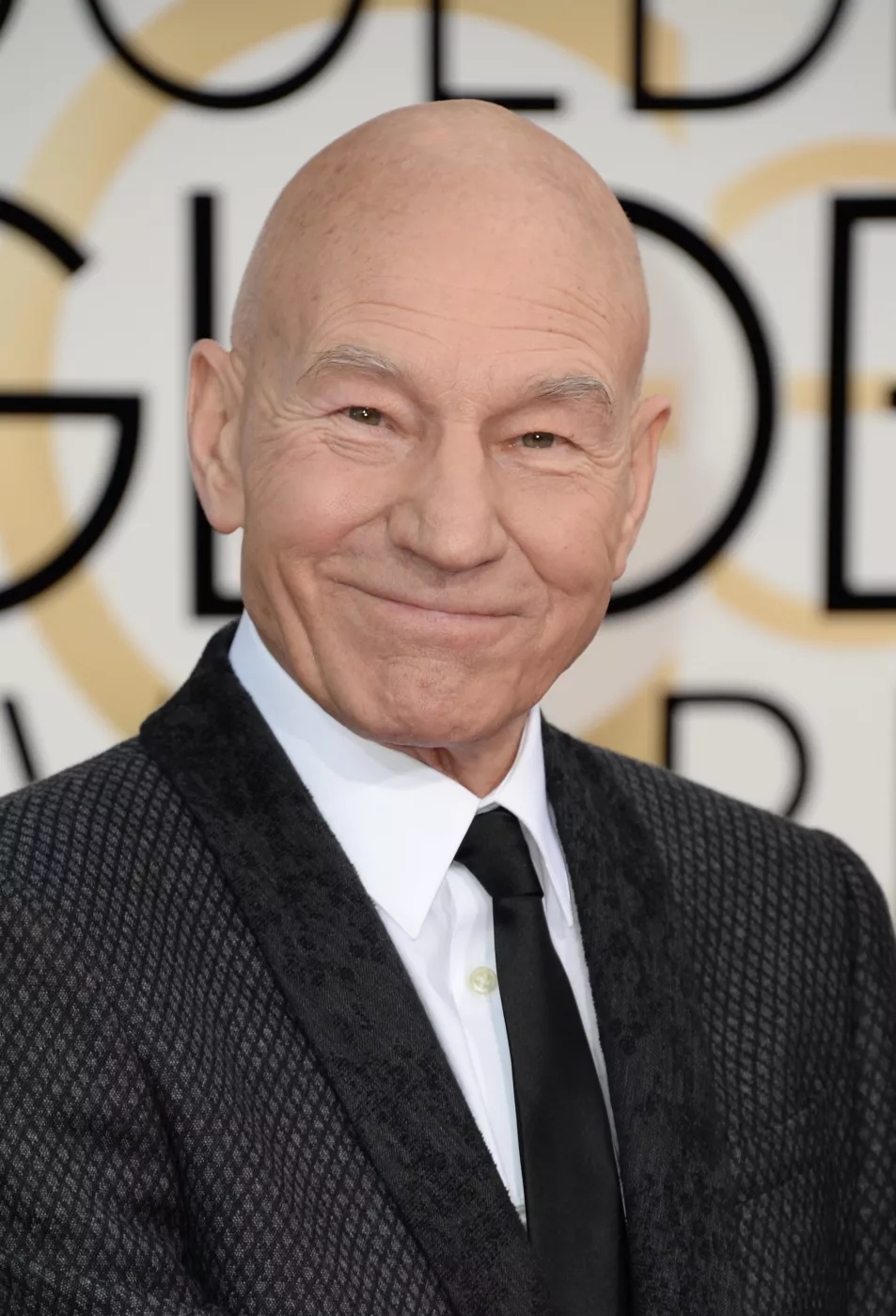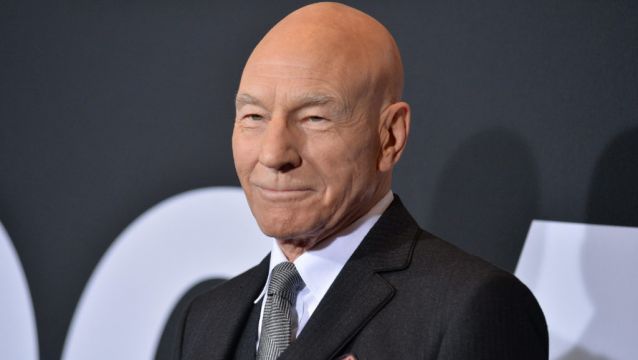Sir Patrick Stewart, Shakespearean actor and king of the Star Trek and X-Men franchises, says that at 83 he is starting to tick things off.
“Riding a bicycle is no longer a good idea for me. I try to exercise as much as I can. I also try very hard to spend as much time as I can with friends, particularly my Star Trek friends, because I love them all and we see one another as often as we can.”
Stewart played Captain Jean-Luc Picard in the Star Trek: The Next Generation TV series from 1987-94, and in its subsequent films and TV spin-offs, but feels he may not quite have finished with the captain.
“I have a feeling that a film based on the Picard series, particularly on the third and final season, would be a very appropriate and I hope entertaining way of saying goodbye to Star Trek,” he suggests.
Today though, he is focusing on his memoir, Making It So (a take on Picard’s often said phrase ‘Make It So’ in the series), which he wrote over three years and which features many stories from his life in theatre and on screen.
Anecdotes abound about the actors he worked with, from Ben Kingsley and David Tennant to his great friend Sir Ian McKellen, who officiated at his wedding, as well as his recollections of those in the audience who’ve watched him, including Paul Newman, Joanne Woodward, Robert Redford and Lauren Bacall.
There are tales of Stewart driving Paul McCartney’s Aston Martin, taking tea with Kirk Douglas, and of Ricky Gervais corpsing when he appeared with him in the TV series Extras.
Yet he still seems rather surprised that he has come from a working-class Northern town, to end up an award-winning actor in Hollywood.
“I had never anticipated that my future might hold these potentials. I never gave a thought to Hollywood, except that I love movies and have done since I was a little boy.”
And he cannot quite believe he’s written a book.
“There’s a word we use in Yorkshire, where I’m from, ‘gob-stopped’,” he says. “And I’m somewhat ‘gob-stopped’ – imagine a mouth wide open but not saying anything.”
Stewart’s story is a real-life rags to riches one. He was born in the small town of Mirfield, in the West Riding of Yorkshire, where the family home had an outside toilet, no central heating and bath night was once a week.
His parents, he recalls, had a complicated relationship. On returning from serving in the Parachute Regiment during the Second World War, his father Alfred became frustrated because he never again achieved that status in Mirfield, becoming a labourer, and took it out on his wife, Gladys, a textile mill worker.
“He had ended his military service as Regimental Sergeant Major of the Parachute Regiment. It was the most senior non-commissioned role in the British Army,” Stewart recalls. “He had a presence, which he was not allowed to have when he came out of the military. He was fundamentally a labourer. He hated it and was embarrassed by it.”
His father became what Stewart describes as a ‘weekend alcoholic’, and recalls how as a boy, he and his brother Trevor would sometimes jump in between his parents to defend their mother.
“It both terrified and shamed me,” he says, struggling to find the words and welling up at the painful recollections.
Yet when appearing on the BBC series Who Do You Think You Are? in 2012, Stewart learned that his father suffered from PTSD, which was known as ‘shellshock’ during the war. No treatment was given. Soldiers were just told to man up.
“He was never given treatment for his PTSD and I spoke to an authority on this, on soldiers and how they deal with these horrifying experiences, and they are very disturbed by it.
“I felt responsible for my father, which may sound crazy – a seven-year-old boy talking about a man in his mid-40s, but that’s how children often do react to situations like this.”
Acting provided his escape – he won a scholarship to the Bristol Old Vic Theatre School – and later joined the Royal Shakespeare Company for 14 years, won multiple Olivier Awards and a Grammy and was launched into the galactic spotlight of fame with Star Trek: The Next Generation and X-Men.
He has also had 30 years of therapy to cope with the impact of the violence, shame and guilt he experienced as a child.
“I was advised to consider psychological therapy. I had never imagined that I would, but it was an immense help, not only to understanding why I had these feelings but an understanding that they weren’t my fault.
“I too had a very minor case of PTSD, which was witnessing the violence my father showed to my mother and finding at 11 o’clock on a Saturday night, policemen and ambulancemen in our two-roomed house.”
Therapy has really helped over the decades: “I still occasionally pay a visit now.”
How else does he look after his mental health?
“Well, gently and, I think, a little wisely. I have come to enjoy friends and loved ones much more than I did before. My life now has a richness to it and I’m not talking about finance, but of experience that has only come upon me because of therapy.”
The height of fame arrived fairly late, through the screen franchises. He was 47 when he took the Star Trek role and pushing 60 when the X-Men opportunity came along, in which he plays the mutant Charles Xavier.
He says he handled fame with some difficulty.

“I didn’t believe in it. The title of my book was originally ‘Are You Anybody?’, a question which was asked of me after the first public performance of David Warner’s Hamlet with the Royal Shakespeare Company.
“When I was at the stage door, there was a group of young women and one of them came forward and thrust an autograph book and a pen at me, and then paused and stepped back and said, ‘Are you anybody?’ I just shook my head and said, ‘Nope, I’m nobody’. That’s how I genuinely felt.”
Now, thanks to Star Wars, he says: “I walk down the streets in Beijing and its citizens shout out the captain’s lines and engage.”
He’s been married to his third wife, US singer songwriter Sunny Ozell, for 10 years.
“She’s made a difference of extraordinary proportions,” he says, with feeling. “She has a great sense of humour, some potent friendships of people she loves very much, including myself, and it’s a great blessing of the latter part of my life that I share it with her.”
Today, they live comfortably in a quiet part of southern California.
“I’m not in the hills, not on a cliff-face, not on the beach, not overlooking the ocean. When Sunny and I bought this house, the one thing we didn’t want was to be threatened by storms, earthquakes, the rising level of the ocean, which is a threat for Malibu.”
He still has goals – Shakespeare parts he hasn’t yet played and other acting opportunities. He’s come a long way from that little house in Mirfield with the outside toilet.
“I’m very happy. I have a wonderful wife and love my work and it brings me so much satisfaction. I consider myself extraordinarily fortunate.”
Making It So: A Memoir by Patrick Stewart is published by Gallery Books UK. Available now.







